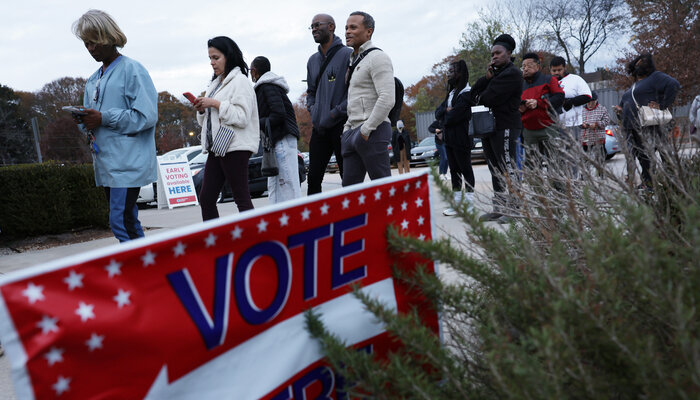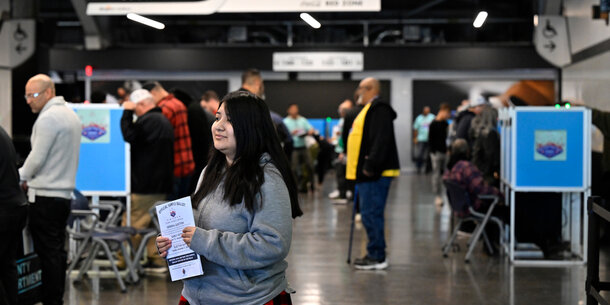Click here for the most recent Voting Laws Roundup.
In 2022, state lawmakers enacted the following voting laws:
- At least 8 states enacted 11 restrictive voting laws.footnote1_D4fNchWcPjD-d2aHJ-O2thiCHjtkRNRqMW34O0uDMPk_cUjBtc7VosxJ1 AZ H.B. 2243, AZ H.B. 2492, MS H.B. 1510, MO H.B. 1878, NH S.B. 418, NJ A.B. 3819, NJ A.B. 3820, OH H.B. 458, OK H.B. 3364, OK H.B. 3365, SC S.B. 108. Overall, at least 408 restrictive bills were considered by lawmakers in 39 states this year.
- At least 7 states enacted 12 election interference laws.footnote2_UZOZCoPe3BzFHHv26N3KZgIE07LDvO7rBreHIyfE_cxKvMyBOCaqS2 AL H.B. 194, AZ H.B. 2237, AZ H.B. 2492, FL S.B. 524, GA H.B. 1015, GA H.B. 1368, GA H.B. 1432, GA S.B. 441, KY H.B. 301, MO H.B. 1878, OK H.B. 3046, OK S.B. 523. Overall, lawmakers in at least 27 states introduced 151 election interference bills this year.
- At least 12 states and Washington, DC, enacted 23 laws that expand access to the vote, 5 of which were enacted after the October edition of the Voting Laws Roundup. footnote3_T1srvWhvtIC4lwywoBwknOlAlFv0—oW0L9EpqTYh8_pXEjh4PfNOXI3 AZ H.B. 2119, AZ S.B. 1170, AZ S.B. 1638, CA A.B. 2815, CT H.B. 5262, LA H.B. 423, LA H.B. 646, LA H.B. 1074, MA S. 2924, NH H.B. 1594, NJ A.B. 3929, NY S.B. 253, NY S.B. 284, NY S.B. 1046, NY S.B. 2951, NY S.B. 7565, OK H.B. 1711, OR H.B. 4133, RI H.B. 7100, RI S.B. 2007, SC S.B. 108, DC C.B. 24–0507, DC C.B. 24–0951. Delaware also enacted DE S.B. 25 and DE S.B. 320, expansive laws that established same-day registration and no-excuse mail voting, respectively. However, both laws were struck down by the Delaware Supreme Court. Albence v. Higgin, No. 342 (Del. Sup. Ct., Oct. 7, 2022). Overall, at least 638 expansive voting bills were considered in 44 states and Washington, DC, this year.
Overall, the number of states that enacted restrictive or election interference legislation — 12 — was the same number that enacted expansive legislation — 12. By and large, those were different states, as some states continue to make it easier to vote, while others continue to make it harder to vote and easier to interfere in elections. In the four states (Arizona, New Hampshire, New Jersey, South Carolina) that enacted laws with both restrictive and expansive provisions, the restrictive measures outweighed the expansive ones.
As of December 6, 2022, a handful of state lawmakers have pre-filed or filed voting bills for the 2023 session.footnote4_-NPDQQ3ho6ZzaATFIucCpU1YBhB0FINj4leheZ88Kc_du0UJZZa4czS4 While the Montana and New Hampshire legislatures have also pre-filed voting bills, full drafts of those bills were not available as of December 6 and have not been included in this report. In Texas, which has been the most active, legislators have pre-filed a number of election interference bills.
Restrictive Legislation
At least 8 states enacted 11 restrictive voting laws.footnote5_D4fNchWcPjD-d2aHJ-O2thiCHjtkRNRqMW34O0uDMPk_n2vQhEnAUndP5 AZ H.B. 2243, AZ H.B. 2492, MS H.B. 1510, MO H.B. 1878, NH S.B. 418, NJ A.B. 3819, NJ A.B. 3820, OH H.B. 458, OK H.B. 3364, OK H.B. 3365, SC S.B. 108. Overall, at least 408 restrictive bills were considered by lawmakers in 39 states this year.
Legislation is categorized as restrictive if it would make it harder for eligible Americans to register, stay on the voter rolls, and/or vote as compared to existing state law. The restrictive voting laws passed this year make mail voting and voter registration more difficult and increase the likelihood of faulty voter purges. Restrictive voting laws have an outsized impact on voters of color. These bills all passed before the midterms and were covered in our October roundup. Since the election, there have been two notable developments.
Midterm voters in Arizona rejected a restrictive voting ballot measure proposed by the state legislature that would have imposed strict voter ID provisions in the state. Voters in Nebraska approved a ballot measure that paves the way for the state legislature to implement strict voter ID requirements, which lawmakers have attempted to do in the past.
OH H.B. 458, a restrictive bill that imposes strict photo ID requirements for voting and limits access to mail voting in several ways was passed by the legislature and signed by the governor on January 6, 2023. Among other things, the bill will eliminate a day of early voting, prohibit prepaid postage, and shorten the deadline to apply for and return mail ballots.
Election Interference Laws
At least 7 states enacted 12 election interference laws.footnote6_m17Gx50Ql62u7-uEPihqJ7Neyj8AxR7-K0xU1y4qgk_ofnKllWGqmuS6 AL H.B. 194, AZ H.B. 2237, AZ H.B. 2492, FL S.B. 524, GA H.B. 1015, GA H.B. 1368, GA H.B. 1432, GA S.B. 441, KY H.B. 301, MO H.B. 1878, OK H.B. 3046, OK S.B. 523. Overall, lawmakers in at least 27 states introduced 151 election interference bills this year.
Legislation is categorized as election interference if it does one of two things: opens the door to partisan interference in elections or threatens the people and processes that make elections work. This year, state legislatures enacted laws that impose new criminal or civil penalties on election officials, redirected or established new resources specifically for prosecuting election-related crimes in Florida and Georgia, and rearrange long-standing election administration structure in favor of partisan influence in Georgia.
Some state legislatures passed almost the same number of restrictive voting laws as election interference laws this year — though not all states overlap — meaning that overall, lawmakers are prioritizing both types of legislation. In Georgia and Florida, for example, each enacted sweeping restrictive laws in 2021, and both state legislatures shifted focus this year, enacting legislation that undermines elections.
Expansive Legislation
At least 12 states and Washington, DC, enacted 23 laws that expand access to vote, 3 of which were enacted after our last roundup. footnote7_EpC8vrLrcopvYF9oXB8fa7BgVn1t6V4xLGGJ2TUrI_f7mpQ6G3y09q7 AZ H.B. 2119, AZ S.B. 1170, AZ S.B. 1638, CA A.B. 2815, CT H.B. 5262, LA H.B. 423, LA H.B. 646, LA H.B. 1074, MA S. 2924, NH H.B. 1594, NJ A.B. 3929, NY S.B. 253, NY S.B. 284, NY S.B. 1046, NY S.B. 2951, NY S.B. 7565, OK H.B. 1711, OR H.B. 4133, RI H.B. 7100, RI S.B. 2007, SC S.B. 108, DC C.B. 24–0507, DC C.B. 24–0951. Delaware also enacted DE S.B. 25 and DE S.B. 320, expansive laws that established same-day registration and no-excuse mail voting, respectively. However, both laws were struck down by the Delaware Supreme Court. Albence v. Higgin, No. 342 (Del. Sup. Ct., Oct. 7, 2022). Overall, at least 638 expansive voting bills were considered in 44 states and Washington, DC, this year.
Legislation is categorized as expansive if it would make it easier for eligible Americans to register, stay on the rolls, and/or vote as compared to existing state law. The expansive voting laws passed this year make mail voting easier, expand opportunities for individuals to register to vote, and create or expand early in-person voting.
Since the publication of our last roundup, midterm voters in Connecticut and Michigan approved expansive voting ballot measures. The Connecticut legislature is now empowered to establish early voting for all voters, and Michigan added several expansive voting policies to the state constitution, including a permanent absentee voter list, minimum availability for drop boxes and early voting, and prepaid return postage for mail ballots.
NY S.B. 2951, which lengthens the deadline to return voter registrations, was also passed by the state legislature and delivered to the governor.
Pre-filed Legislation
Most states will begin a new legislative cycle in 2023,footnote8_amlsIqZRSemPGzFtxXBL-gXjS6qi8RhPvrMWmUoZF0_t3rMC9qPoS4e8 California’s 2023 legislative session began on December 5, 2022. Montana, Nevada, North Dakota, and Texas meet for regular session every other year, and each will meet in 2023. New Jersey and Virginia’s current legislative session will end at the close of 2023. and at this time, there is limited information about what voting legislation will emerge. The window to pre-file bills — that is, submit bills for introduction before the start of a legislation session — for next year has already opened in multiple legislatures.footnote9_0ksYXdMwXmGVYy0MON0bm2ZHnxSNViiR2WIDGaTOyVo_cloJU8guqIGD9 As of December 6, 2022, prefiling periods had begun in Arkansas, Colorado, Florida, Georgia, Illinois, Indiana, Iowa, Kansas, Kentucky, Maine, Maryland, Mississippi, Missouri, Montana, Nevada, New Hampshire, New York, North Dakota, Oklahoma, Oregon, Rhode Island, Tennessee, Texas, Utah, Virginia, Washington, and Wyoming. Not all state legislatures allow for prefiling bills. As of December 6, 2022, only a handful of states had pre-filed voting bills, with Texas being the most active. Although activity was limited, it shows some indicators of legislative priorities for 2023.
The Texas legislature, which has historically pushed for restrictive voting legislation, pre-filed election interference bills as well as expansive voting bills. The 2023 session will be the legislature’s first since enacting S.B. 1, the omnibus restrictive voting legislation, in 2021.
Two related election interference bills would dedicate state resources to pursuing election crimes by empowering the secretary of state’s office to appoint election marshals tasked with investigating and referring for prosecution violations of election law.footnote10_lIpnPYFYWS6eoL1iRMsmhgJSZIiUfoZ2sbHIAWSe3g_kKFNgiuGNn6M10 TX H.B. 549, TX S.B. 220. The bills echo FL S.B. 524 and GA S.B. 441, laws passed this year that also direct state resources toward election crimes, an unusual way to spend state funding.
These Texas bills, like the laws passed in Florida and Georgia this year, shift authority over the investigation and prosecution of election crimes to offices controlled by the governor or the legislature and away from prosecutors that operate independently from the political branches. The introduction of this legislation in Texas follows a ruling from the state’s highest criminal court holding that the attorney general has no authority to initiate criminal proceedings because that function belongs to district attorneys, who are in an independent branch of government. Prior to that ruling, the attorney general had pursued a number of aggressive and politicized investigations and prosecutions of voters and election officials. Given that history, the attempt to shift authority over the enforcement of election law from district attorneys to the political branches is particularly concerning. Building criminal infrastructure around elections contributes to an atmosphere of fear and mistrust around voting.
Lawmakers focused on election interference legislation in 2022. That the Texas legislature began pre-filing election interference bills at the first opportunity could indicate that election interference legislation – particularly bills creating criminal infrastructure around elections—will continue to be a priority for lawmakers in 2023.
The barrage of litigation filed in 2022 seeking to reduce access to mail voting — such as by shortening ballot receipt deadlines, constricting signature verification procedures, and reducing drop box availability — may also result in legislative proposals that would restrict access to voting by mail. Restricting mail voting has been a legislative trend since the 2020 election.
Both election interference legislation and restrictive voting legislation are often justified by lawmakers as necessary to prevent election irregularities and defend against mythical, widespread voter fraud. Most recently, they have pointed to false conspiracy theories that spread after the 2020 election.
Other legislation in states that pre-filed bills by December 6 include expansive legislation to establish or expand automatic voter registration,footnote11_pKCEJQhYN4a1i34Rs7iN0aOgtP2AqzZfuSjX2s5HxY_kdwsP91QPJXG11 MO H.B. 318, TX H.B. 119, TX H.B. 849. restore the franchise to individuals convicted of felonies,footnote12_HUVaGrli34bK4pqU3DUNkpibmVosycGpgTZmrbgUKs_n4G6TzQLQogv12 MO H.B. 248, TX S.B. 210, TX H.B. 355, VA S.J.R. 223. and expand acceptable forms of in-person voter ID.footnote13_na7CcBDXGJkV8kgewUCAdiIyNq9DDV8IcQZ2YXkig9w_c33B4E7sgSvS13 MO H.B. 219, TX H.B. 75, TX H.B. 354, TX S.B. 116.
End Notes
-
footnote1_D4fNchWcPjD-d2aHJ-O2thiCHjtkRNRqMW34O0uDMPk_cUjBtc7VosxJ
1
AZ H.B. 2243, AZ H.B. 2492, MS H.B. 1510, MO H.B. 1878, NH S.B. 418, NJ A.B. 3819, NJ A.B. 3820, OH H.B. 458, OK H.B. 3364, OK H.B. 3365, SC S.B. 108. -
footnote2_UZOZCoPe3BzFHHv26N3KZgIE07LDvO7rBreHIyfE_cxKvMyBOCaqS
2
AL H.B. 194, AZ H.B. 2237, AZ H.B. 2492, FL S.B. 524, GA H.B. 1015, GA H.B. 1368, GA H.B. 1432, GA S.B. 441, KY H.B. 301, MO H.B. 1878, OK H.B. 3046, OK S.B. 523. -
footnote3_T1srvWhvtIC4lwywoBwknOlAlFv0—oW0L9EpqTYh8_pXEjh4PfNOXI
3
AZ H.B. 2119, AZ S.B. 1170, AZ S.B. 1638, CA A.B. 2815, CT H.B. 5262, LA H.B. 423, LA H.B. 646, LA H.B. 1074, MA S. 2924, NH H.B. 1594, NJ A.B. 3929, NY S.B. 253, NY S.B. 284, NY S.B. 1046, NY S.B. 2951, NY S.B. 7565, OK H.B. 1711, OR H.B. 4133, RI H.B. 7100, RI S.B. 2007, SC S.B. 108, DC C.B. 24–0507, DC C.B. 24–0951. Delaware also enacted DE S.B. 25 and DE S.B. 320, expansive laws that established same-day registration and no-excuse mail voting, respectively. However, both laws were struck down by the Delaware Supreme Court. Albence v. Higgin, No. 342 (Del. Sup. Ct., Oct. 7, 2022). -
footnote4_-NPDQQ3ho6ZzaATFIucCpU1YBhB0FINj4leheZ88Kc_du0UJZZa4czS
4
While the Montana and New Hampshire legislatures have also pre-filed voting bills, full drafts of those bills were not available as of December 6 and have not been included in this report. -
footnote5_D4fNchWcPjD-d2aHJ-O2thiCHjtkRNRqMW34O0uDMPk_n2vQhEnAUndP
5
AZ H.B. 2243, AZ H.B. 2492, MS H.B. 1510, MO H.B. 1878, NH S.B. 418, NJ A.B. 3819, NJ A.B. 3820, OH H.B. 458, OK H.B. 3364, OK H.B. 3365, SC S.B. 108. -
footnote6_m17Gx50Ql62u7-uEPihqJ7Neyj8AxR7-K0xU1y4qgk_ofnKllWGqmuS
6
AL H.B. 194, AZ H.B. 2237, AZ H.B. 2492, FL S.B. 524, GA H.B. 1015, GA H.B. 1368, GA H.B. 1432, GA S.B. 441, KY H.B. 301, MO H.B. 1878, OK H.B. 3046, OK S.B. 523. -
footnote7_EpC8vrLrcopvYF9oXB8fa7BgVn1t6V4xLGGJ2TUrI_f7mpQ6G3y09q
7
AZ H.B. 2119, AZ S.B. 1170, AZ S.B. 1638, CA A.B. 2815, CT H.B. 5262, LA H.B. 423, LA H.B. 646, LA H.B. 1074, MA S. 2924, NH H.B. 1594, NJ A.B. 3929, NY S.B. 253, NY S.B. 284, NY S.B. 1046, NY S.B. 2951, NY S.B. 7565, OK H.B. 1711, OR H.B. 4133, RI H.B. 7100, RI S.B. 2007, SC S.B. 108, DC C.B. 24–0507, DC C.B. 24–0951. Delaware also enacted DE S.B. 25 and DE S.B. 320, expansive laws that established same-day registration and no-excuse mail voting, respectively. However, both laws were struck down by the Delaware Supreme Court. Albence v. Higgin, No. 342 (Del. Sup. Ct., Oct. 7, 2022). -
footnote8_amlsIqZRSemPGzFtxXBL-gXjS6qi8RhPvrMWmUoZF0_t3rMC9qPoS4e
8
California’s 2023 legislative session began on December 5, 2022. Montana, Nevada, North Dakota, and Texas meet for regular session every other year, and each will meet in 2023. New Jersey and Virginia’s current legislative session will end at the close of 2023. -
footnote9_0ksYXdMwXmGVYy0MON0bm2ZHnxSNViiR2WIDGaTOyVo_cloJU8guqIGD
9
As of December 6, 2022, prefiling periods had begun in Arkansas, Colorado, Florida, Georgia, Illinois, Indiana, Iowa, Kansas, Kentucky, Maine, Maryland, Mississippi, Missouri, Montana, Nevada, New Hampshire, New York, North Dakota, Oklahoma, Oregon, Rhode Island, Tennessee, Texas, Utah, Virginia, Washington, and Wyoming. Not all state legislatures allow for prefiling bills. -
footnote10_lIpnPYFYWS6eoL1iRMsmhgJSZIiUfoZ2sbHIAWSe3g_kKFNgiuGNn6M
10
TX H.B. 549, TX S.B. 220. -
footnote11_pKCEJQhYN4a1i34Rs7iN0aOgtP2AqzZfuSjX2s5HxY_kdwsP91QPJXG
11
MO H.B. 318, TX H.B. 119, TX H.B. 849. -
footnote12_HUVaGrli34bK4pqU3DUNkpibmVosycGpgTZmrbgUKs_n4G6TzQLQogv
12
MO H.B. 248, TX S.B. 210, TX H.B. 355, VA S.J.R. 223. -
footnote13_na7CcBDXGJkV8kgewUCAdiIyNq9DDV8IcQZ2YXkig9w_c33B4E7sgSvS
13
MO H.B. 219, TX H.B. 75, TX H.B. 354, TX S.B. 116.





